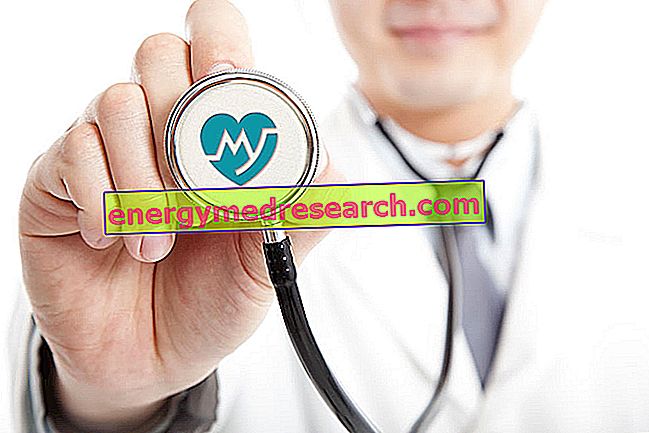Muscular catabolism is a phenomenon mainly induced:
- from malnutrition (as happens in the Third World or in case of eating disorders - DCA)
- alcoholism
- from some chronic diseases
- from sporting practice NOT correctly supported by the power supply.
NB . the presence of over-training can also contribute.
In some EXCESSIVELY protracted and / or intense sporting performances (marathon, march, triathlon-iron man, cycling tour, etc.) muscle catabolism (normally appropriately compensated by recovery, ie by anabolic hormones + nutritional molecules) can be excessively activated even in conditions of eunutrition and / or adequate rest.

Muscular catabolism therefore represents an undesirable effect of tissue turnover, characterized by an evident imbalance between the demolition of the plastic structures of the muscle and the consequent restoration or supercompensation.
Despite having different etiological causes (and severity), muscle catabolism occurs ALWAYS by the same process: insufficiency of glucose in the tissues as an indispensable energy substrate for cell respiration; moreover, that the sugar deficit affects only the muscles recruited in the athletic gesture or the entire human machine (as happens in some unbalanced diets, in the caloric / protein malnutrition of the less well-off populations, in some eating disorders, in alcoholism or, even worse), in complicated liver cirrhosis), in the medium-long term you will still get impaired blood sugar.
Recall that carbohydrates, defined as NOT essential because they can be synthesized by hepatic neoglucogenesis, are indeed NECESSARY for survival and decisive for the success of sports performance, both aerobic and anaerobic (read the article: Crisis in hunger during sport).
During exercise, their lack can cause:
- An increase in the oxidation of amino acids in food proteins that, if used for energy production, CANNOT fulfill the plastic requirements (unless they are present in excess in the diet, but in this case it would be necessary to take into account the side effects of a hyper-protein diet)
- An increase in muscle proteolysis resulting from the exhaustion of:
- fasting hepatic glycogen
- liver and muscle glycogen during exercise.
BOTH THESE CASES DETERMINE MUSCULAR CATABOLISM, BOTH FOR DIRECT OXIDATION OF BRANCHED AMINO ACIDS AND FOR NEOGLUCOGENESIS OF OTHER TISSUE PROTEIN BRICKS.
NB . If muscle catabolism has as its primary etiological cause the activity NOT compensated for, the tissues primarily and mainly involved are those assigned to the specific athletic gesture (eg the legs of the cyclist or of the marathon runner).
Muscle catabolism in sport
Ultimately, the muscular catabolism of the sportsman occurs mainly due to the imbalance between motor activity on the one hand and feeding + rest on the other. In reality, the topic would be very vast, multifaceted and full of insights, so it is not possible to summarize it exhaustively in these few lines; on the other hand, the objective of the article is to direct readers towards a greater awareness of the phenomenon ... and above all to prevent the possibility of commercial fishing being carried out by the major producers of food supplements.
Why should an athlete in good health incur muscular catabolism?
It is not so frequent how one can believe but it is still possible; the most obvious case concerns body lovers, who pursue the goal of enhancing muscle mass, consequently reducing fatty fat (a phase called definition or cutting). Often these subjects incur in muscle catabolism due to the unification between physical exercise (promiscuous, both anaerobic and aerobic) and a low-carb diet, perhaps ketogenic and in any case hyper-protein. In this case, the diet not adequately rich in carbohydrates (REQUIRED for PROLONGED muscular exercise) determines the depletion of glycogen reserves and the consequent hypoglycemia; in such stressful conditions, the body reacts by releasing certain specific catabolic hormones (glucagon, various catecholamines and, often, also cortisol) which facilitate both lipolysis and muscle protein catabolism. On the other hand, a bodybuilder who pursues the goal regardless of aerobic activity and carefully choosing the muscle table will significantly reduce the onset of muscle catabolism; in this case, the anabolic stimulus induced by the exercise of musculation (appropriately compensated by the correct recovery times) is "almost always" sufficient to guarantee a stasis (maintenance) of the hypertrophy also in conjunction with a diet low in sugars (especially variable based on subjectivity).
Another fairly frequent case is that of vegan (non-vegetarian) sportsmen; those who follow a diet totally devoid of foods and ingredients of animal origin or derivation, often do not introduce a sufficient quantity of protein to guarantee the correct up-take of the essential plastic amino acids of tissue proteins. In this situation, muscle catabolism is induced by a PROPORTIONALLY hypo-protein diet, or rather by a diet deficient in high biological value peptides. Obviously, we talk about sportsmen and not sedentary people who, fortunately, can maintain a good state of health by respecting protein coefficients equal to 0.75g / kg of physiological weight (commonly complied with by a well-calibrated vegan regime). Ultimately, the vegan regime is a diet that hardly meets the needs of an athlete with high goals, both in body-building and in competitive sports activities.
How to avoid / compensate for muscle catabolism
Avoiding muscle catabolism is not difficult, it would be enough to respect a balanced and balanced diet based on specific physical-sporting activity. Each discipline requires energy costs and very precise mixtures of substrates, which is why (in the search for maximizing performance or slimming / muscle definition) the intervention of a food specialist is required; it is certainly not an essential requirement ... but often it makes the difference!
Can the use of food supplements limit muscle catabolism?
Obviously, in the presence of a NOT balanced diet, every saint helps!
On the other hand, it does not make much sense to take food supplements as much as "tighten the belt at the table" ... but it seems that the marketing company has managed to convince different consumers that: a simple over-the-counter product can, not only replace food, but even exceed them in quality and nutritional richness. I personally believe that muscle catabolism in sporting activity is INEXORABLE within percentages of 2-4% compared to the overall energy cost but, with a correct diet combined with a correct recovery, it is possible to drastically limit the use of food supplements. It is obvious that, for an elite athlete who practices at least 15 hours of weekly training, the "bogeyman" of muscle catabolism appears with greater firmness and importance; in this case, both for the body and for the mind (since autosuggestion is a determining phenomenon), the use of malto-dextrin supplements (carbohydrates) and branched amino acids (BCAAs) can be absolutely profitable.
Nevertheless, the statistics state that the majority of athletes who integrate (various products: proteins, BCAAs, maltodextrins, essential AAs, arginine, glutamine, creatine, etc.) do not get any appreciable benefit since, as reiterated, a calibrated diet, balanced and associated with the right rest is almost always more than enough to prevent and compensate for the muscular catabolism induced by intense and prolonged physical exercise.



